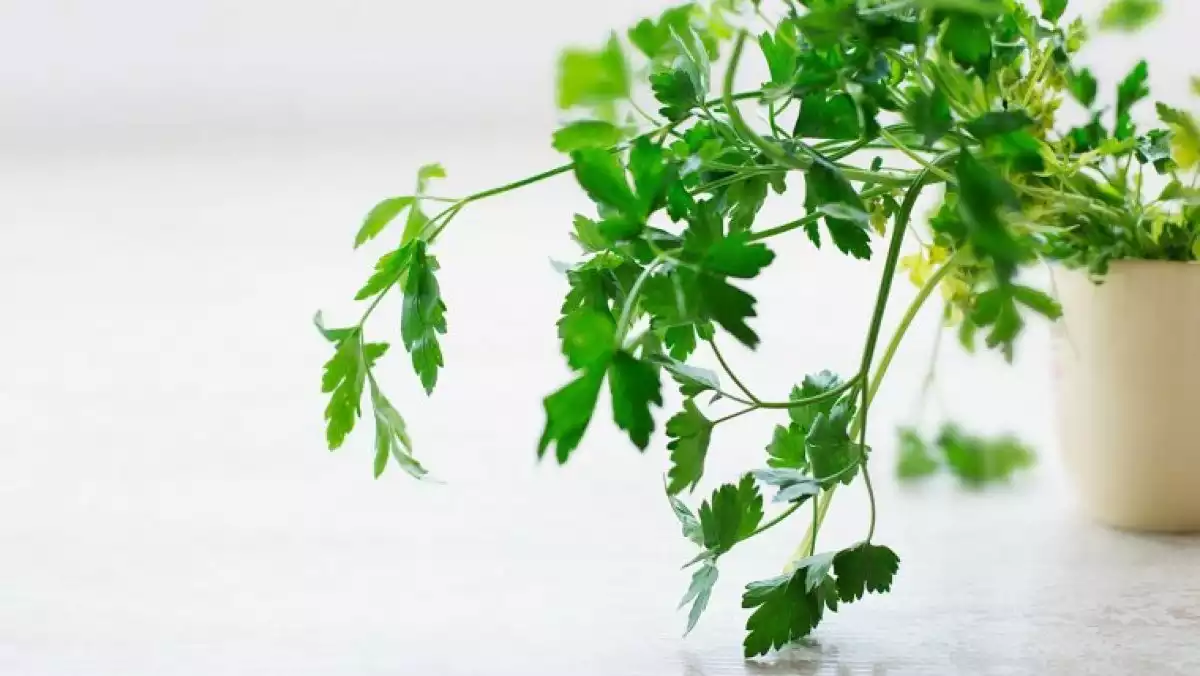
Parsley is widely known as an aromatic plant used for cooking or decorating dishes. It is, however, highly appreciated for its medicinal uses: parsley has been used as a natural remedy against many ailments and conditions.
To shed more light on this type of herb, we will explain what parsley is, what it is used for, what benefits it possesses as well as examine the benefits of drinking parsley tea. Finally, we will have a look at the connection between parsley and abortions.
What is parsley and where does it come from?
Parsley is a type of culinary herb part of the Apiaceae family of plants, which includes other vegetables such as carrots, parsnip, and celery.
The scientific name is Petroselinum crispum, and it belongs to the same family as the hemlock (Conium maculatum), a highly poisonous plant.
The origin of parsley can be traced back to the Mediterranean area, but it subsequently spread across the world. A specific type of parsley root, known as the Hamburg parsley, has a root six times bigger than the typical plant and it can even grow to heights of 1 meter in its second vegetative year.
Parsley is a biennial plant (needs two years to complete its biological lifecycle) and also a self-seeding plant that grows in moist soil either in direct sunlight or partial sunlight. It sprouts from one root that produces smooth, juicy stems that branch out. Certain types of parsley have flat leaves while others have smaller and curlier leaves.
Parsley blooms in summer and its seeds are small, egg-shaped and their color varies between grey and brown.
Myths and legends
Persephone, the Greek goddess of the underworld and Hades' wife, has a special connection to parsley. Seeing how this plant takes very long to germinate, in ancient time, it was believed that parsley had to travel seven times to Hades and back before it could sprout on Earth.
Parsley was also used in Greek culture as a funeral plant and people would cover the graves of their loved ones with it in hopes of covering the bad odor. It was also a common belief that parsley only grew in the gardens of strong-willed, powerful women. Roman gladiators also ate this plant before facing their enemies.
Finally, in the Middle Ages, parsley reached its maximum mythical potential and people thought it had lethal powers: according to ancient legend, you could kill a person if you pulled a parsley root out while saying that person's name.

Properties and benefits
The many benefits of parsley are associated with the high concentration of Vitamin A (retinol) and beta-Carotene that it contains. It also has elevated amounts of Vitamins C, K, D and some vitamins from the vitamin B-complex such as the thiamine (B1), riboflavin (B2), niacin (B3), pantothenic acid (B5), and Vitamin B6.
Parsley also has properties that are connected to other nutrients such as calcium, magnesium, manganese, phosphorus, selenium, zinc, potassium, and iron. It strengthens the bones, and aside from being widely used in cuisines, parsley roots, leaves, and seeds also have potent medicinal effects.
1. Diuretic quality
Essential parsley oil, especially the one extracted from seeds, contains parsley camphor and myristicin. These elements are diuretic although they are also believed to act as uterine stimulants.
The diuretic effect of this plant is associated with bigger retention of potassium in the small intestine. This is why drinking parsley tea is considered to help reduce swelling and lose weight due to excess liquid being eliminated.
2. Antiallergic properties
Parsley juice suppresses histamine secretion, a molecule associated with allergic reactions. This is why it's considered a powerful ally against specific allergy symptoms. Parsley also helps to alleviate insect bites, and acts as a natural repellent.
3. A remedy for kidney stones
This aromatic herb has been used traditionally as a method of eliminating kidney stones and as a liver tonic. The effects of these therapies, however, are still being investigated to this day.
4. Laxative and cough suppressant
Parsley contains the chemical compound saponin, which helps alleviate the effects of a dry cough.
Its root has laxative properties, and its carminative action relieves flatulence and cramps.
5. Minimizes odor
The high percentage of chlorophyll makes parsley a strong natural deodorant. In simple terms, you could add parsley to any processed foods that contain garlic or onion, and it would minimize the smell of said vegetables. It's also a useful trick in case you have bad breath.
6. Alleviates pain
Fresh parsley leaves can help alleviate many types of pain when applied topically. One example would be treating chafing in the breast area for lactating women or help cure other joint issues.
This plant is also helpful in treating tired eyes and bruises, and when applied in liquid form it can help reduce ear and tooth pain.
7. Stimulates hair growth
Applying parsley seed powder on your scalp and massaging it for four days is believed to be an effective home remedy that stimulates hair growth. The powder is also useful should you struggle with head lice.

Parsley tea and infusions
As we've discovered earlier, parsley contains a significant concentration of beta-carotene which has diuretic properties and can help eliminate toxins.
Many of this plant's nutrients are found in its root, and the best way to extract them is through decoction (boiling.) Both parsley tea and parsley infusions share the following qualities:
Improve the circulatory system
Prevent and fight against the flu and the common cold
Alleviate exhaustion
Reduce inflammation in the body
How to make the infusion
One way of making a parsley infusion is to put five glasses of water in a pot and bring it to a boil after which you add five teaspoons of freshly cut parsley.
You should let it boil for a few minutes while stirring to avoid burning. Set aside and let rest for 20 minutes before straining the infusion. It's important to drink the concoction after it cooled down, three times a day; you may keep it in the fridge for up to two days.
Contraindications: Is there a connection between parsley and abortion?
Parsley has specific contraindications due to its side effects, and one should always be wary before consuming large quantities of this plant. The reason for this warning are the two main components of parsley: apiole and myristicin, which have potent abortion-inducing properties that cause uterine contractions.
This being said, the exact amount of parsley needed to cause an abortion is unknown, and this type of abortion technique is highly unsafe and could cause serious health issues and lead to death.
This is why parsley is completely forbidden to pregnant and lactating women.
Parsley could also irritate the kidney tissues, which is why people with renal problems should consult their doctor before eating this plant. Parsley essential oil can also cause intoxication.
References:
Hanrahan, C., & Frey, R. J. (2005). Parsley. In J. L. Longe (Ed.), The Gale Encyclopedia of Alternative Medicine (2nd ed., Vol. 3, pp. 1554-1556). Detroit: Gale.
Zidorn, C., Jöhrer, K. & Ganzera, M. (2005). Polyacetylenes from the Apiaceae vegetables carrot, celery, fennel, parsley, and parsnip and their cytotoxic activities. Journal of Agricultural and Food Chemistry, 53(7).
